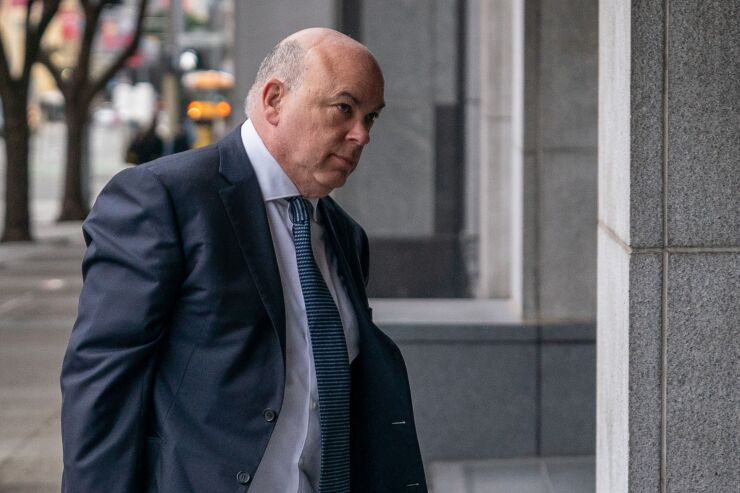U.K. tech tycoon Mike Lynch masterminded a "massive fraud" to dupe Hewlett Packard Co. into buying his software startup for $11 billion, a U.S. prosecutor told a jury.
Lynch's Autonomy Corp. used a number of accounting tricks to make its revenue growth appear better than it was, such as back-dating contracts, pretending to ship goods and overpaying for unnecessary services so vendors would then buy Autonomy products, Assistant U.S. Attorney Adam Reeves said in his opening argument Monday at a trial in San Francisco federal court.
It would cap a remarkable downfall for Lynch if he's convicted in the criminal trial that's scheduled to go for three months. He was the darling of the U.K.'s tech industry before his 2011 sale of Autonomy, which was then the nation's second-largest software company.

The trial will feature much of the same evidence and witness testimony that helped Hewlett Packard persuade a London judge to conclude in 2022 in a civil trial that Lynch and Autonomy's former finance chief Sushovan Hussain inflated the startup's revenue to pull off the sale. Hussain was convicted of accounting fraud in 2018 by a San Francisco jury and sentenced to five years in prison.
"You will learn that these deals made no sense unless you were trying to falsely inflate your revenue," Reeves said. He also argued that Lynch's co-defendant Stephen Chamberlain was in charge of lying to auditors to cover up the fraud.
'Ain't the way'
Lynch's lawyer, Reid Weingarten, countered in his opening that the government's narrative paints a black-and-white picture and "that ain't the way the world works."
The alleged backdating of contracts, for example, was "benign" and other examples of the alleged fraud were "nothing other than normal business done by Mike Lynch," Weingarten told the jury.
Lynch, who was extradited to the U.S. last year, is charged with 14 counts of wire fraud, one count of securities fraud and one count of conspiracy to commit wire fraud. The most serious charge carries a maximum 25-year prison term if he's convicted.
The entrepreneur has argued that he was
'Desperate shape'
"When HP bought Autonomy, Autonomy was rated as a $6 billion business by the market," Weingarten said Monday. "HP, because they were in such desperate shape — they so needed to do something — paid over $11 billion."
While the government sought to portray Autonomy as a flailing business, Weingarten said the
The defense lawyer also told jurors Lynch was "not an accountant, not interested in accounting" and that it's not true he was "omnipotent" at Autonomy. Hussain made "virtually all the accounting decisions the government challenges," Weingarten said. Lynch will testify in his own defense, the attorney said.
Chamberlain's attorney told jurors his client was always "open and honest" with the auditors and that he wasn't part of Autonomy's senior management team, nor did he have final say in accounting decisions.
'A pawn'
"He has spent the last 12 years caught up as a pawn in a battle between titans," lawyer Gary Lincenberg said in his opening argument.
The case against Lynch will likely hinge on showing what he knew and when he knew it,
"In my experience, though, CEOs are quite aware of these things," Cusumano said.
The case is U.S. v. Lynch, 18-cr-00577, U.S. District Court, Northern District of California (San Francisco).





